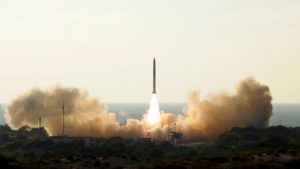
The South Korean military is considering leasing an Israeli Ofek reconnaissance satellite, according to South Korean news agency Yonhap.
With tensions between Seoul and North Korea increasing in recent months, South Korea’s military urgently requires a satellite reconnaissance capability that can provides its political and military leadership with enhanced strategic depth and early warning of North Korean military, ballistic missile, and nuclear activities.
Until now South Korea has relied on commercial satellite imagery and space-derived intelligence from its ally, the United States. Yet more recently the North Koreans, under the leadership of Kim Jong-Un, have been increasingly belligerent and threatening with numerous nuclear weapon and ballistic missile tests. The revelation, therefore, that South Korea is mulling leasing an Israeli Ofek reconnaissance satellite suggests that Seoul needs maximum coverage of North Korea.
The South Korean military does have plans to acquire five of its own high-resolution reconnaissance satellites, but this programme’s schedule has slipped by several years.
“The military is expected to have its own surveillance satellites as early as 2023 that will allow Seoul to closely monitor military activities in North Korea,” said a ministry official quoted by Yonhap.
“It is years behind the defense ministry’s original schedule to deploy five surveillance satellites between 2021 and 2022 as part of the country’s “kill chain” strike system to deal with missile threats from the North,” according to the same official.
The Israeli Ofek reconnaissance satellite series is a very high-resolution and capable system. The Israeli Ministry of Defence (MoD) launched its latest satellite, Ofek-11, last month. The launch was a troubled one, with Israeli engineers and officials initially unable to establish contact with Ofek-11, but within days they had recovered the satellite. It is now believed that Ofek-11 is fully functioning and producing useful intelligence for the Israelis.
One particular reason why Ofek might be of interest to the South Koreans is that the satellites circle the Earth in an equatorial orbit, unlike most reconnaissance satellites that use polar orbits. Both Israel and the Korean Peninsula are located between 30 and 40 degrees latitude north of the equator. By using an equatorial orbit Ofek satellites can focus on areas of immediate interest to Israel (and, by extension, South Korea) every 90 minutes or so.
At the time of publication there was no word from the Israeli government about the prospect of South Korea leasing one of its reconnaissance satellites.
Original published at: http://spacewatchme.com/2016/10/south-korea-considering-leasing-israeli-reconnaissance-satellite/
 SpaceWatch.Global An independent perspective on space
SpaceWatch.Global An independent perspective on space

